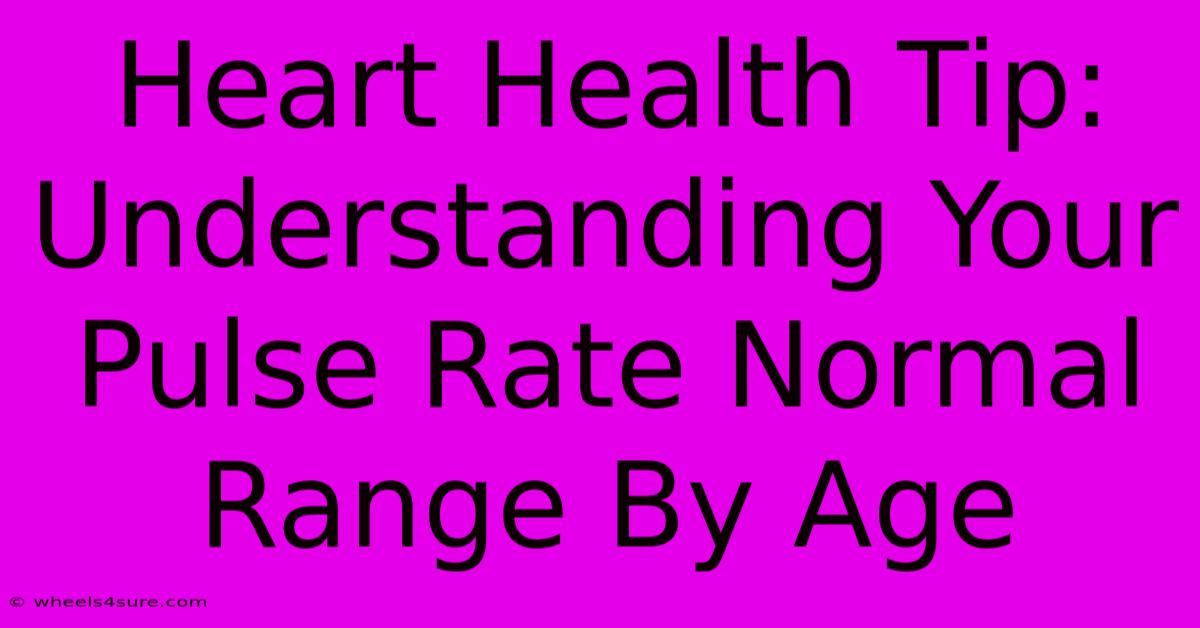Heart Health Tip: Understanding Your Pulse Rate Normal Range By Age

Table of Contents
Heart Health Tip: Understanding Your Pulse Rate Normal Range By Age
Knowing your pulse rate is a fundamental aspect of understanding your heart health. Your pulse, the rhythmic throbbing of your arteries, reflects your heart's activity. A normal pulse rate varies depending on factors like age, fitness level, and overall health. Understanding your personal normal range is crucial for identifying potential issues and maintaining cardiovascular well-being. This guide will help you understand the normal pulse rate range by age and what factors can influence it.
What is a Normal Pulse Rate?
A normal resting pulse rate generally falls between 60 and 100 beats per minute (BPM) for adults. However, this is just a general guideline. A lower resting heart rate often indicates better cardiovascular fitness, while a higher rate might suggest underlying health conditions. It's important to note that what's considered "normal" can vary significantly depending on your individual characteristics.
How to Check Your Pulse
Checking your pulse is simple and can be done at home. Here's how:
- Find your pulse: Common locations include your wrist (radial artery) or neck (carotid artery).
- Use your index and middle fingers: Gently press your fingers against the artery until you feel a rhythmic beat. Avoid using your thumb, as it has its own pulse that can interfere with your reading.
- Count the beats: Count the number of beats in 60 seconds (one minute) for an accurate measurement. Alternatively, you can count for 30 seconds and multiply the result by two.
- Record your reading: Keep a record of your pulse rate at different times of the day and under various circumstances. This helps establish your baseline and identify any significant deviations.
Normal Pulse Rate by Age Group
While the 60-100 BPM range applies to most adults, the normal pulse rate varies considerably across different age groups:
- Infants (0-1 year): 70-190 BPM
- Toddlers (1-2 years): 80-130 BPM
- Children (3-5 years): 80-120 BPM
- Children (6-10 years): 70-110 BPM
- Children (11-14 years): 60-105 BPM
- Adults (15+ years): 60-100 BPM
- Well-trained Athletes: Often have resting heart rates below 60 BPM. This is due to increased cardiac efficiency.
Important Note: These are just average ranges. Individual variations are expected. If you have concerns about your pulse rate, always consult a healthcare professional.
Factors Affecting Pulse Rate
Several factors can influence your pulse rate, including:
- Physical activity: Your heart rate will increase during and immediately after exercise.
- Medications: Certain medications can affect heart rate, either increasing or decreasing it.
- Body temperature: Fever can elevate your pulse rate.
- Stress and anxiety: Emotional stress can lead to a faster heart rate.
- Dehydration: Lack of fluids can also cause an increase in pulse rate.
- Underlying medical conditions: Various health problems, including heart conditions, thyroid issues, and anemia, can affect your pulse rate.
When to See a Doctor
While variations in pulse rate are common, it's essential to seek medical attention if you experience:
- Persistently high pulse rate (tachycardia): A consistently elevated heart rate above 100 BPM at rest could indicate a problem.
- Persistently low pulse rate (bradycardia): A consistently low heart rate below 60 BPM at rest may also be a cause for concern.
- Irregular heartbeat (arrhythmia): Noticeably irregular or erratic heartbeat requires immediate medical evaluation.
- Dizziness or lightheadedness: These symptoms, especially when accompanied by an abnormal pulse rate, should be investigated by a doctor.
- Chest pain: Chest pain or discomfort should never be ignored and warrants immediate medical attention.
Conclusion: Know Your Numbers
Monitoring your pulse rate is a simple yet powerful tool for maintaining heart health. Understanding your normal range by age and being aware of factors influencing your pulse rate can help you identify potential issues early. Regular check-ups with your doctor and attention to your overall well-being are essential for maintaining a healthy heart. Remember, a healthy heart is a happy heart! Don't hesitate to seek professional advice if you have any concerns about your heart rate.

Thank you for visiting our website wich cover about Heart Health Tip: Understanding Your Pulse Rate Normal Range By Age. We hope the information provided has been useful to you. Feel free to contact us if you have any questions or need further assistance. See you next time and dont miss to bookmark.
Featured Posts
-
Ice Age A Prehistoric Adventure
Apr 04, 2025
-
Snapchat Age A Comprehensive Guide
Apr 04, 2025
-
Dragon Age Veilguard Unlock All Trophies Easily
Apr 04, 2025
-
Mrs Lowry And Son A Story Of Unconditional Love
Apr 04, 2025
-
The Power Of Perseverance Sebastian Dobrincus Net Worth
Apr 04, 2025
